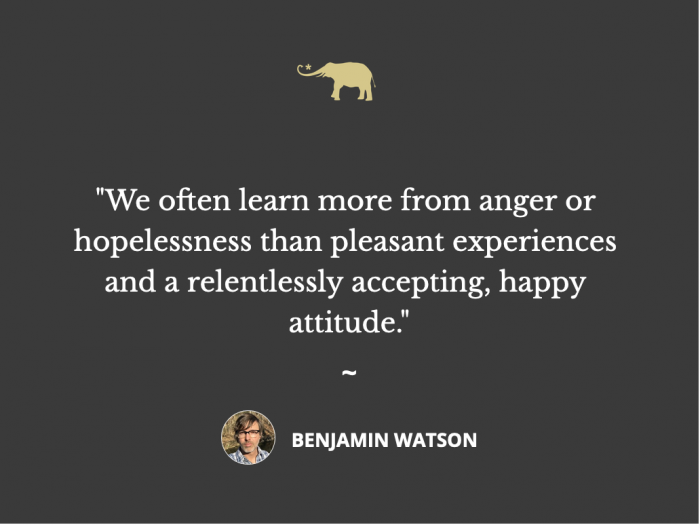You have been lied to.
Especially in America. Everywhere you turn, you are admonished to be happier. Movies, TV shows, magazine articles, workshops, books. They all tell you that you are not quite enough.
You should be more mindful! You should be doing more yoga! Eating better! Working through your traumas better! Being more productive! More calm!
Essentially, being a better version of yourself means a happier, shinier, more spiritual you.
Yet who declared that happiness is the “raison de vivre?” Who decided that being happy is the ultimate goal of being human? The evidence around us points to other conclusions. To turn on the news, walk out your door, or have moments of reflection and self-examination, leads us to understand that the world is often tragic, brutal—completely unfair and unjust.
Expecting to find happiness for most of our lives is akin to living in a war-torn and poverty-stricken village and believing that you live in Disneyworld.
Okay, your life is not a war-torn village. But it certainly isn’t Disneyland. (Thank goddess.) Who wants to live in a land of blandly attractive people paid to smile, giant dancing mice, and middle-aged women wearing pink satin jackets with Tinkerbell on the back?
There is a middle path. One I learned fairly recently, through much trial and error and suffering and self-judgment. You see, I don’t believe in the concept of “happiness” anymore. To be consistently happy—or striving to be—seems to ignore all the other more subtle, intricate, and poetic aspects of being alive. I do not know how to be happy or peaceful. Instead, I know now to strive to create more moments of happiness, more moments of peace.
And this is how it should be. Instead of looking toward a goal of “being happy” as a way to exist, as a realistic and positive goal, we can instead choose a more expansive and human goal of experiencing more moments of happiness.
Our template for this new vision can be Rumi’s poem “The Guest House”:
This being human is a guest house.
Every morning a new arrival.
A joy, a depression, a meanness,
some momentary awareness comes
as an unexpected visitor.
Welcome and entertain them all!
Even if they’re a crowd of sorrows,
who violently sweep your house
empty of its furniture,
still, treat each guest honorably.
He may be clearing you out
for some new delight.
The dark thought, the shame, the malice,
meet them at the door laughing,
and invite them in.
Be grateful for whoever comes,
because each has been sent
as a guide from beyond.
All our emotions are visitors to our mind and spirit, with their own interesting conversations to share. Some even bring wine. Yet, the darker emotions of anger, guilt, and regret must not visit too long before they are told to get steppin’ down the road. But they are still welcome and respected visitors. They are not always fun, but they are interesting and instructive (and often tell good dirty jokes).
When my older brother took his life when I was 26, I went on a literary search for the meaning of life. I had been raised as a born-again Christian but had eventually turned away from its ideas of an angry, judging God, those who were “saved” and “not saved” based on praying one correct prayer. I wanted a bigger and more inclusive spirituality.
Working as a hotel bellman next to the Boston Public Library, after my shift, pocket bulging with cash tips, I would peruse and check out dozens of books regarding the meaning of life and what comes next. I read books about near-death experiences, spirit channeling, astral projection, and hypnotic regression. Awash in this New Age soup of information, I tried to read with skepticism and still came away with a sense that my questions had been answered and the meaning of life now made some sort of sense.
The writer about astral travel came upon an entity that informed him that the earth dimension is known as a place of “problem-solving.” The atheist hypnotherapist with a medical degree accidentally brought a client who was trying to quit smoking to a time before they were born. He regressed many other patients and developed an outline of why we incarnate and what the afterlife is like.
He determined that we come to Earth to evolve through challenges and expand ourselves through creative acts and thoughts. The channelers discussed numerous ideas of Earth being an amazing opportunity for evolution—understanding emotions and the wisdom they bring. According to him, the near-death experiences often implied that the afterlife was perfect and joyful, while Earth was difficult and full of opportunities for karmic balancing and spiritual progression.
As the Buddha said: “Life is suffering.”
Yet, we don’t have to jump to the idea that we can overcome this suffering by meditating enough, letting go enough, being centered enough. There is always a middle path. Apparently, some people have found ways to find happiness and peace—often gurus of some sort (or Oprah). I find it hard to believe this is really possible. Still, I also recognize that I often look at existence through gray-colored glasses—through the prism of my neurotic, anxious, overthinking, depressive self.
But, I also don’t really desire a state of continual peace and happiness. It sounds pretty great in theory. But, I also need to be able to feel rage when another Black person is murdered by police. I need to feel despair when another teen kills themselves due to cyberbullying. I need to be able to listen to The Smiths on a rainy November afternoon and feel like a lost, lonely teenager.
I desire something more than happiness. I desire the full experience of life, all the mysterious, complex, confusing, exasperating, exhilarating feelings.
Happiness is wonderful, but it is only one piece of the pie. All the other emotions are delicious too. Who wants to eat apple pie all their lives when there is also peach, blueberry, pecan, and banana cream? Sometimes the pie is bitter lemon, but that is good too, in its own way.
Life is hard. Life is really, really hard, sometimes. It is always a yin-yang—the sweet and the bitter, the beast and the angel, the fire and the cold water. Sometimes, we are competent superheroes at parenting or our careers; sometimes, we are on our couches, deep into a bag of salt and vinegar Kettle Chips and a third glass of Pinot Noir, weeping over something we will barely care about two days from now.
There is no Darwinian reason for how we suffer—how we so naturally cause ourselves and others to suffer. Our drama, our complexity, our brilliant capacity to shame and sabotage ourselves…it serves no real evolutionary purpose. In fact, it holds us back from peace and productivity. Yet, we modern, 2021 humans only seem to grow more complicated in finding ways to delve deeper into our wounds and self-awareness. Like, who hasn’t been to therapy? This is all good. We continue to expand our capacity for self-examination and empathy. Awareness is what we ultimately seek. Consciousness is our highest goal—not happiness.
Happiness may be one aspect of consciousness, just as sadness, anger, confusion, and loneliness are. All of these feelings have value and wisdom to give. The trick is to not stay stuck in the darker aspects, the darker visitors in our guesthouse. Ideally, happiness is who you host most often, in your kitchen or living room—the rooms you spend the most time in—but the other rooms and guests in your house are also valuable and worthy of your time (even if they drink all your beer and keep you up later than you would prefer).
We may think we want our lives to be a continual romantic comedy, full of meet-cutes and uplifting music as you kiss your lover in the rain. Yet, this is just not how life on Earth is constructed to be. Again, read the news. We must also allow ourselves to star in dramas, tragedies, dumb sitcoms with laugh tracks, and boring-but-necessary documentaries about fossil fuels. We must recognize the value of varied experiences and varied emotions. We often learn more from anger or hopelessness than pleasant experiences and a relentlessly accepting, happy attitude. To paraphrase Benjamin Franklin: there is enough time for happiness and peace in the grave (afterlife).
I would argue that happiness, like masculinity, can even be toxic. Happiness: a thrusting phallus of overconfident direction and trust in life’s inherent perfection. Sometimes, you leap and the goddamn net doesn’t appear. Sometimes, you hang in there like the kitten in the 1980s posters, and you still eventually lose strength and fall to some sort of metaphoric death. That’s okay. Death and birth, that’s what it boils down to, eventually.
Hey, don’t be so hard on yourself. You don’t have to be mostly happy to lead an amazing, fulfilling, powerful, and meaningful life. Many of our most interesting, creative, and impactful fellow humans led lives full of inner conflict, doubt, and emotional roller coasters.
The goal is authenticity. The goal is awareness and consciousness. The goal is acceptance. The goal is, yes, love.
If you’re happy much of the time, good on you. Should that not be your personality type—should your astrology not point to that reality, should you be a moody poet who is often sad but also often appreciating every full moon and every connective wave of the leaves in the summer winds before a storm—then you are fulfilling your human destiny. Good on you.
At last, all we must really do is be aware, be conscious, be interested in growth, be humble, and be kind. That is a happy life—even if happiness is just a slice of the pie. There are many good flavors: strawberry, peach, pecan, banana cream, even the bitter taste of lemon. Taste them all, and do not judge; just enjoy the variety.
Those of us who agreed to come to Earth to be human (I believe we choose to do this) should feel pride. The merging of flesh and spirit is not smooth or simple. There are so many ways to feel pain, to suffer, while in this body and mind. So many ways to also experience joy, large and small. Be kind to yourself, and don’t let happiness bully you. That’s not the only thing that matters—a yardstick of success or “non-success.” It is one tool for the experience.
We are living through one of the strangest, hardest, most confusing times in modern history. Enjoy the ride. You are doing great. Just be; just observe; just do your best (however you define that).
Allow this massive sea of change in human history to free you from your former constructs of what makes a good and successful life.
We are in a major renaissance, right now, of who we next choose to be. Dive deep into yourself and love what you find, and gently change what you don’t love.
If you fail, that’s okay too. You are doing your best in your wonderfully imperfect and human way.
What else matters?


 Share on bsky
Share on bsky





Read 44 comments and reply